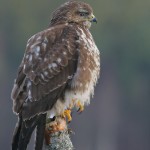It would be perfectly possible to write about birds of prey, how wonderful they are and their troubled and shortened lives, every day on this blog. I try not to do that because there are other sites that do it so well (raptor politics and raptor persecution Scotland) and because there are other big issues in the world of nature conservation. But there is so much going on that I make only the scantest apology for coming back to the subject yet again for a round-up.

I had to listen to the programme to hear which pieces the BBC used and where they appeared. I was very happy with the programme as a whole but I bet all the contributors felt that their best points never made it into the programme! With a recorded programme like this you don’t usually hear any of the other contributors’ points as you are recording yours. So, as a contributor, until the programme goes out you really don’t know what the other folk said (except in the broadest terms) and you don’t know which few minutes of all that excellent and fascinating chatter that you gave the programme-makers they have used.
A bit of fun with buzzards and pheasants: one of the most useful books in my library is Birds in Europe: population estimates, trends and conservation status which was published in 2004 and so is now a bit out of date. It has population figures (no doubt of varying reliability) of all birds for all European countries.

The UK has (had) 1,800,000 – 1,900,000 pairs of pheasant whereas France has (had) 100,000 – 300,000 pairs of pheasant. Now what counts as a pheasant is a matter of opinion as we know that c35,000,000 pheasants are released annually in the UK (many of them having been imported from France, actually) so there are an awful lot more pheasants in the UK in autumn and winter than the number you would expect from the population at the start of the breeding season. Can anyone tell me how many pheasants are released in France – not nearly as many as in the UK I would guess?
I wouldn’t draw many firm conclusions from these slightly aged, and perhaps slightly unreliable, data but it looks as though. even ignoring the millions of released birds, the average pheasant in the UK has to worry about one fiftieth of a buzzard whereas in France the average faisan needs to worry about three-quarters of a buse variable. In other words, there are 35 times as many buzzards per pheasant in France than in the UK.
 It was good of Defra to consider looking at the buzzard ‘problem’ on behalf of Richard Benyon’s and David Cameron’s pheasant-shooting mates but maybe they should just have asked the French how they cope? That has been made more difficult with the removal of the French-fluent Caroline Spelman (with her First Class degree in European Studies) from Defra and her replacement with the Euro-rather-more-than-sceptic Owen Paterson who doesn’t really want to listen to anyone (although he does wish to check their use of commas,, ,,, ” ;;;;).
It was good of Defra to consider looking at the buzzard ‘problem’ on behalf of Richard Benyon’s and David Cameron’s pheasant-shooting mates but maybe they should just have asked the French how they cope? That has been made more difficult with the removal of the French-fluent Caroline Spelman (with her First Class degree in European Studies) from Defra and her replacement with the Euro-rather-more-than-sceptic Owen Paterson who doesn’t really want to listen to anyone (although he does wish to check their use of commas,, ,,, ” ;;;;).
Ms Spelman’s fluent German would have allowed her to ask about the huge problems that must come from the 67,000- 100,000 pairs of Maussebusard in Germany (and yes mausse is ‘mice’) eating their way through the 120,000-200,000 pairs of Fasan. Maybe Mr Paterson was off on a study tour when he stomped out of Thursday’s badger debate and was allegedly heard to mutter that he ‘couldn’t stand this‘.
Scotland is different: you probably remember the moving story of the eagle that moved in the night – a horrific incident to my mind.
 I wrote, as did many of you I know, to the Scottish Environment and Climate Change Minister as an English visitor to Scotland, spending my money in Scotland’s rural communities, saying that I was upset by the continuing persecution of Scotland’s birds of prey and it made me less keen to come to Scotland and spend my money.
I wrote, as did many of you I know, to the Scottish Environment and Climate Change Minister as an English visitor to Scotland, spending my money in Scotland’s rural communities, saying that I was upset by the continuing persecution of Scotland’s birds of prey and it made me less keen to come to Scotland and spend my money.
I got this very full, only slightly mealy-mouthed, and generally positive response. I was very impressed by the speed of the response, its obvious personal nature, the fact that it was from the Scottish government to an English voter, and its content. I cannot imagine that Defra would act as quickly, answer so fully or be so positive about the extent of raptor persecution. But that is one of the advantages of devolution – different issues can move more quickly in different parts of the UK. The Scots didn’t have to wait for the English before they proscribed carbofuran and other poisons, and they are obviously proud of the fact that they have introduced vicarious liability for wildlife offences and believe that they see signs of it already making a difference.
Here is the full reply with some particularly good bits highlighted by me:
Our ref: 2012/0031358
8 October 2012
Dear Mr Avery,
Thank you for your letter of the 25 September 2012 to the Minister for Environment and Climate Change, Mr Paul Wheelhouse. I have been asked to respond.
I agree that the media reports were a terrible story of the suffering of a young golden eagle. The reports may suggest that the circumstances of this incident were suggestive of an offence however there is no hard evidence and it remains possible that there is an alternative explanation. It is therefore not appropriate for me to comment on this case as an example of illegal activity.
Tackling wildlife crime is a priority for the Scottish Government. Scottish Ministers have been closely involved in the development of a broad partnership with law enforcement, conservationists and land managers that is dedicated to dealing with all forms of wildlife crime, and in particular raptor persecution.
You ask what the Scottish Government is doing. The introduction of vicarious liability provisions in the Wildlife and Natural Environment (Scotland) Act 2011 came into force on 1 January 2012. This is already having a significant effect as the due diligence defence has prompted many landowners and managers to examine their procedures, training and equipment for employees and contractors and also to remind them of their responsibilities under the law with regard to wild birds.
We agree that the unlawful killing of any raptors has no place in today’s Scotland and will continue to work hard to eradicate this criminal activity. We believe that the partnership approach is bringing the reduction in bird of prey poisoning that can be seen in the statistics published by the Partnership for Action Against Wildlife Crime (PAW) Scotland, in recent years. However we are not complacent and if there is evidence of a switch to other methods of persecution we will take action to bear down on those methods.
The Scottish Government has funded a number of initiatives to help tackle raptor persecution, including supporting satellite-tagging of raptors and supporting the National Wildlife Crime Unit, which is based in Scotland, and directly funding dedicated police work tackling raptor persecution.
You also ask why you should spend your ‘holiday pounds’ here in Scotland. Wildlife tourism is a valuable and growing sector of Scotland’s vital tourist industry and one that you consciously contribute to. The Scottish Government is keen to promote this form of tourism. However, we do not see wildlife tourism as being in conflict with well-managed shooting businesses which themselves generate significant income and employment in our rural economy, often in areas where there are few alternative opportunities.
Many visitors will come to Scotland to take advantage of world-class sporting opportunities that are enhanced by the range and quality of Scotland’s native wildlife. However we very much agree that any business which carries out illegal persecution of raptors threatens our reputation for a high-quality natural environment. This is of course one of the reasons we are very determined to stamp out these practices. We believe that an approach of seeking to improve the effectiveness of law enforcement while working with partner organisations to isolate those persisting with illegal practices is the best way forward.
To conclude, the Golden Eagle Conservation Framework published by Scottish Natural Heritage in 2008 identified persecution in eastern Scotland and food shortages in the west
as threats to the conservation status of golden eagles. It is difficult to estimate the amount of illegal persecution, but we recognise that in the longer term the best measure of success in dealing with raptor persecution will be when vacant golden eagle territories, as identified in the Framework document, are re-occupied.
Yours faithfully
Vicarious liability: the epetition on vicarious liability has another three weeks to run and is still stuck in the 10,000s rather than reaching the dizzy heights of 100,000 signatures. It’s a pity that the RSPB did not get behind this epetition (but that’s the last time I intend to say that here) as we might now be following a badger debate with a bird of prey persecution debate in the Houses of Commons. I watched much of the badger debate on TV on Thursday and was (generally) impressed by the contributions, and anyone who did watch and listen would have learned a lot about MPs (there are some very good ones and some rather dull ones) and badgers and bovine TB. A raptor persecution debate right now would have given a boost to the Law Commission’s wider deliberations. It would also have put MPs in the position of having to speak publicly about the issue which would be a good thing too.
But ‘Well done!’ to Chrissie Harper for getting things going. And even 10,000 signatures is impressive. Don’t lose sight of the fact that this epetition is the second-most supported epetition on Defra’s work still on the HM Government website (only the highly successful badger epetition has more signatures. And crossing the 10,000 barrier does trigger (!) a response which I received recently. It’s not a very good response, and I wish that nice Scottish person had been drafting it instead of Defra, but it is a response. More than 10,000 people will have received this response and been disappointed or perhaps angry. Many of them will be slightly less likely to vote for the coalition government which has taken this position. Here it is with the good bits highlighted as with the Scottish Government letter (only joking – there aren’t any good bits to highlight):

The e-petition ‘Introduction of offence of vicarious liability for raptor persecution in England’ signed by you recently reached 10,587 signatures and a response has been made to it.
As this e-petition has received more than 10 000 signatures, the relevant Government department have provided the following response: Defra is aware of the Scottish Government’s decision to introduce a vicarious liability offence under the Wildlife and Natural Environment Act (Scotland) 2011, which came in to force on 1 January 2012. The new offence is targeted principally at addressing the persecution of raptors. The new offence will mean employers or agents may be prosecuted where an employee is found to have illegally killed a bird of prey (or other wild bird) – in effect they may be prosecuted for the same offence. There is, however, a defence that an employer or agent can rely on, this being that they did not know an offence was being committed and that they took all reasonable steps to prevent an offence being committed. It is unclear whether in practice the new offence will result in successful prosecutions of employers or agents. There are no immediate plans therefore to introduce a similar offence in England but Defra will look carefully at how the offence works in practice in Scotland. The development of our future wildlife crime policy will include consideration of how effective the new offence in Scotland has been in helping to address raptor persecution. This e-petition remains open to signatures and will be considered for debate by the Backbench Business Committee should it pass the 100 000 signature threshold.
The Law Commission consultation: you have until the end of November to respond to this. I will come back to it nearer that time.
November Birdwatch: there’s an interesting review of the ‘terminal plight’ of the hen harrier in the current Birdwatch written by Neil Randon – well worth a read although it isn’t the most cheerful of prospects.
And there are a couple of interesting letters at the back of Birdwatch about raptor issues. One takes me to task about getting on my high horse (I pity the horse!) now when I was silent about raptor issues when working for the RSPB. This fills me with a mixture of sadness and amusement. Sadness because that is presumably what the writer believes and yet wasn’t how we saw things when I was at the RSPB and it’s a shame that we didn’t get our messages across to everybody. But amusement, or at least a wry smile, when I think of the letters of complaint, vitriol in the shooting press, arguments face to face with the shooting community, rough receptions at the Game Fair and solicitors’ letters which I received because I was (and the RSPB was, and we both still are) standing up for raptors.
Here are some of the easily accessible things that I said about raptor persecution when at the RSPB just for info:
2011: 27 April 2011, 14 March 2011, 2 March 2011, 3 February 2011, 31 January 2011
2010: November in The Guardian, July,
And here are some of my fans in the shooting community who seem to have noticed the occasional RSPB comment on the subject: James Marchington 2 March 2011, National Gamekeepers’ Organisation in 2010 (I think) and Scottish Countryside Alliance 2008.
[registration_form]
If the employers didn’t know what their gamekeepers were up to, how come in most cases they continue to employ them after they been prosecuted??
I enjoy your blogs mark – please never stop fighting for birds.
Mark,
I thought at first that my response from “The Scottish Government” was word-for-word identical to yours but I’m pleased to say that it’s not, unlike the responses that seem to chrun out from “The English Government”. Much cut & paste of text but tailored to answer the specific questions I asked. My local MP however follows the party line and gives me answers to questions I didn’t ask and fails to answer those I do!
Robin – yes that is a good point. I have sen a few of the responses from the Scottish government too and many of them are actually tailored to the specific question asked. They do a much better job than the Defra churning out of standard letters whatever the question. We English are being short-changed by Defra.
A useful and interesting round-up, thanks. If you will excuse a pedantic comment, though, the German for Common Buzzard is Mäusebussard and the German for mice is Mäusen. I will happily admit that this does not make a jot of difference to the point you are making with which I agree entirely!
If I am being pedantic I had beter get it right! Mäuse not Mäusen!
“how come”
It’s the quid pro quo for not resorting to the Nuremberg defence at the trial.
An excellent blog, Mark, with many interesting viewpoints. I think it would be particularly revealing to the people at DEFRA to read the paragraph from the Scottish environment chappie which states: This is already having a significant effect as the due diligence defence has prompted many landowners and managers to examine their procedures…etc. etc. Legislation is used also as a deterrent not just as a punishment for wrongdoing! The prospect of prosecution concentrates the mind.
As Sue says “never stop fighting for birds”
It’s such a shame people are still persecuting raptors in the UK (and let’s not forget some other EU nations). This was an issue when I was a small child at school, some 13 years ago. In my opinion little has changed, in fact I think it’s got worse. In my job I would often see Kestrels hovering alongside the roads, in a average trip I would see 25 birds in different locations, today I would be lucky to see 5. Though added to that is an increase in the number of Buzzards, next time you’re travelling down the M1 have a look between Junction 17 and Junction 15. It used to be with Buzzards that it was often the case they were more common up north (Cheshire in particular) and the further south and east you went the less you saw. Though that has been reversed.
However the fact is Hen Harrier populations have dived. I would like to see Scotland adopt the Golden Eagle as a National Emblem (got to be better than the Thistle) and introduce even tougher penalties. I’ve already suggested the repossesion of land/estates/property under the procedes of crime act. TOUGHER ACTION needs to be taken as the current law/system is blatantly not working.
As Owne Patterson said on ITN “tonight people will be shooting furry animals, wether it be lamping for foxes and rabbits, it’s what happens in the countryside, I’m from the countryside”…well that makes it ok then Owen, we saw your blood lust in them eyes…
Sorry to be pedant Douglas but only very recently have buzzards become common in Cheshire. Think you perhaps meant Cumbria.
http://www.cheshireandwirralbirdatlas.org/species/buzzard-breeding.htm
Slightly off-topic but as it has been such a cold, wet and rather miserable morning, I decided to read through the Hansard transcripts of Thursday’s badger debate. Fascinating. I applaud those MP’s that have have taken the time to understand the science and made an informed and constructive contribution to the debate. In particular , the inestimable Caroline Lucas, was outstanding despite the obvious disadvantage of there “not being many badgers in her own constituency”.
However shame on those MP’s that have either have not looked at the evidence or have chosen to ignore it. I was particularly struck by the lightweight pro-cull arguments put forward by some MP’s, notably Daniel Kawczynski and Fiona Bruce.
One comment that stood out for me, was one put forward by Andrew Miller (Ellesmere Port and Neston) (Lab):
“I want to start by commenting on the use of language in the debate. In his statement to the House a couple of days ago, the Secretary of State, who is not in his place (presumably having flounced out of the Chamber by this point) used the words “evidence” 15 times, “scientific” nine times and “science” 16 times. It is interesting to read his qualifications. On his website, he describes himself as having
“read History at Cambridge University” and that as
“Agriculture spokesman he became an expert on bovine TB and campaigned for the dairy industry.”
We must use language carefully, because it is pushing the boundaries to say one is an expert on a subject. My good friend Lord Krebs, who chairs the sister Committee of mine in the other place, has considerably more expertise on this subject than I have, but I doubt whether he would call himself an expert. It is bold of the Secretary of State to describe himself as an expert “.
By all accounts most of one side of the House reacted to Andrew Millers observation with hoots of derision and one back bencrewind used him of making a “cheap shot”.
To my mind Andrew Miler made a very important point. Perhaps there should be rule in place which states that if any Govt minister that declares the themselves to be an ‘expert’ in a subject without reasonable grounds for doing so then they are automatically be deemed unfit for office. Can you imagine the outcry from the BMA if the Minister for Health declared that himself to be an expert on the common cold or venereal disease ?
An expert is one highly qualified to misinterpret facts within a narrow field
Joe W – great comment!
By the way, Owen Paterson is apparently fluent in both French and German. The latter should come as no great surprise given the obvious opportunities for exporting leather to the German lederhosen market.
Joe W – 😉
Yes Mark I agree I feel very let down by RSPB over their failure to really get behind the VL petition. I have, however (temporarily) forgiven them as they have definitely done what was necessary on the Walshaw Moor situation. Perhaps they have a cunning plan that we are not yet fully aware of to provide even more help for the Hen Harrier and other raptors?
Good blog/comments for a dismal wet Sunday.
Tony – thanks.
Do not think anyone could have done any more for BOP either while at the RSPB or since,well done Mark.
For sure Scotland try much harder than England on helping BOP.
I am not pro cull on Badgers but it shows how confusing things can be as culling in other country’s perhaps especially Ireland seems to work and in the Telegraph today Christopher Booker writes(which I assume is true?).A trial cull in Donegal cut TB in local cattle by 96%.
Dennis – many thanks.
Hi Mark,
I really enjoy reading your blog posts; though as you will well know, I don’t agree with all your stand points or opinions!
This is a great round up of the issues. Though I should say that I am one of the few (I suspect) that cannot agree with your sympathy for the hunting industry (being that I have abstained from consuming meat/fish my whole life, I guess I am free to hold this opinion without fear of being accused of hypocrisy). I have worked very closely with shooting estates over the years both when working as a nature reserve warden, species protection and latterly as an ecologist. I can say that I Do hold some respect for some gamekeepers (though having carried out some work on a rather infamous southern Scottish estate……not all!). However I do strongly feel that there is no place for hunting for ‘sport’ in our modern society.
The rather watery update by DEFRA regarding legislation for VL was disappointing, but of course no surprise. Our current government is proving that it has worse ethics relating to wildlife and care for its voters (well at least those voters below their pay grade) than any previously in the modern era.
Owen Paterson has only been in the job a short while; but has already proven his distain for the environment, voters and democracy. Things really have to change!
I class myself as an active conservationist; though I feel that my ability to compromise is reducing day by day! As I said previously, I may not always agree with you, but I do feel that what you do is vital. Your approach will be far more successful in achieving positive change than mine 🙂
Keep fighting the fight; and know that your intentions will always have the support of dreamers such as myself!
Tristan – thanks. I think we agree on many things.
Regarding buzzards, my gamekeeper source said they would take some young pheasant, but the main problem is when they fly over a driven shoot, pheasant scatter in all directions rather than towards the guns of the punters who’ve paid large amounts of money for the pleasure of blasting them into the next plane of existence…
The same goes for any other species of raptor flying over a shoot. Shooting driven game (including non-native pheasant) and having our native raptors living in their natural habitat would appear to be mutually exclusive events.
The few young pheasant buzzards take isn’t the real problem, it’s just used as justification for ‘control’.
Vicarious liability is an absurd concept unless you can prove the landowner was complict in which case it is simply ‘aiding and abetting’. Taken to extreme, one should ask whether companies should be fined when their drivers cause accidents. The onus is on the person who commits the offence to a) take the rap or b) refuse and then report if he is asked to act illegally.